|
|
Sickle

|
|
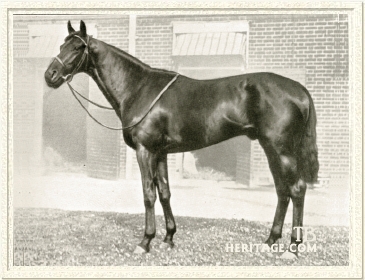 |
|
|
One of two leading sires produced by his dam, Selene, Sickle was also one of the first sons of Phalaris to be imported to stand at stud in America. Through his grandson Polynesian, and Polynesian's son Native Dancer, his sireline has spread throughout the world, and through Sharpen Up, Sea-Bird, Raise a Native and Mr. Prospector, is one of the most powerful branches of the Phalaris sireline in North America.
Sickle was bred by Lord Derby, and was the first foal out of his champion homebred filly Selene. He was born on February 8, 1924 and grew to be a bigger horse than his dam, but still at 15.3 hands, on the small side of average, on legs that were a little short, a trademark of Selene's descendants. Beyond that, however, he was built more along the lines of his sire, Phalaris, who was a lengthy type, well muscled, with a long, level hip. Loaded with quality, a photo shows Sickle to have had a slightly straight neck, moderately upright shoulders and pasterns. A sleek dark brown colt, he had no white markings. As a racehorse, he had his mother's game, competitive spirit, but as a stallion, could be a rough customer.
Sickle on the Turf
Trained by George Lambton, Sickle came to the races at two and made seven starts. He was forward enough to debut in the New Stakes at Royal Ascot, in which he was second by a length and a half to the more experienced Damon, with the good colt Adam's Apple (winner of the next year's 2,000 Guineas) third in the field of 19. Sickle's next out was the July Stakes at Newmarket, in which he was second by three-quarters of a length to another more experienced colt in The Satrap, who continued his undefeated streak on the way to becoming the leader of the juvenile division, with Call Boy (winner of next year's Derby) in third.
In his third start, Sickle went to Liverpool for the five furlong Mersey Stakes, a race which attracted only one other opponent, which he defeated by six easy lengths. Next time out, Sickle faced a weak field of six in the Prince of Wales's Stakes (6f. Goodwood) and beat Casino by five lengths. In the Champagne Stakes (Doncaster), he was third in an exciting finish that found Damon ahead of Call Boy by a neck, with Sickle just a half length behind. Sickle returned to winning form in the Boscawen Post Stakes (5f. 134 yds.), beating three unprepossessing rivals by three lengths. His final start of the year was in the Middle Park Stakes at Newmarket, which, although in the absence of Damon, provided another thrilling finish, with Call Boy winning by a head over Sickle, who was closing resolutely and never faltered, with Birthright just a short head behind.
Sickle closed his juvenile record with three wins, three seconds and one third in seven starts, never unplaced, never failing to run his race. On the Free Handicap, The Satrap was the highweight with 126 pounds (9 stone), with Damon second at 124, Call Boy and Birthright evenly ranked third (123 pounds), with Sickle and Adam's Apple both ranked behind them at 122 pounds.
At three, Sickle ran just three times, and showed about the same level of class against his contemporaries as the year before until injury ended his campaign. He opened the season in the Union Jack Stakes at Liverpool running second to Buckfast who won by two lengths, although the other colt carried 111 pounds to Sickle's 130. Next out was the 2,000 Guineas, won by Adams Apple, who prevailed by a short head over Call Boy, with Sickle just half a length back in third in a field of 23.
In the Derby Stakes, Call Boy won rather easily by two lengths over Hot Night, Shian Mor, and Buckfast. Sickle was well placed and managed fifth over a distance that was beyond his best effort. He returned from the race appearing in good sorts, but the uphill climb to the finish at Epsom had taken its toll. Sickle later came up "stiff and sore," in his pasterns, and was unable to be brought back to the races. He ended his career with a record of ten starts, three wins (all at two), and earnings of £3,915.
Sickle in the Stud
Having shown to be one of the best of his age at two and three with first class ability up to a mile, Lord Derby retired Sickle to stud for the 1929 season in England, after which the American Joseph E. Widener came over to discuss stallion prospects. His premier stallion, Fair Play, the sire of Man o'War, was aging (and in fact would die in December of 1929). Widener arranged to lease Sickle for three years with an option to purchase at the end of that period, and Sickle was sent to Widener's Elmendorf Stud in Kentucky to stand his first American season in 1930. [His year-younger brother Pharamond II preceded him in Kentucky, standing the 1929 season at Beaumont Farm.] In 1932, with his first American foals now yearlings, the option to purchase Sickle was exercised for $100,000.
|
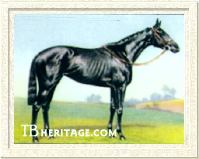
The Half-bred Versicle |
|
The stallion's first crop included three stakes winners -- the good filly VERSICLE (b.f. 1930 out of Verdict by Shogun), also Sickle Moon and Prairie Moon. At two, Versicle won the Prince of Wales's Plate, Home-Bred Plate (York), Holiday Plate (Sandown), and Stud Produce Stakes (Newmarket). At three, she won the Ribblesdale Stakes (Ascot, beating Solenoid and Dastur), and Knowsley Dinner Stakes). |
After his first American-bred foals raced in 1933, Sickle became a sensation in the U.S. as well. In all, he sired 297 foals, 45 stakes winners, and was the Leading Sire in 1936 and 1938. His sire championship in 1936 was the result of his prolific early crops, with the three-year-old Brevity and two-year-old Reaping Reward leading the pack. In 1938, his leadership was headed up by the champion colt Stagehand, probably his best runner. He was also third on the sires list in 1945, and the Leading Sire of Two-Year-Olds that year due to the exploits of his champion son Star Pilot, born after his sire's death.
Sickle became acutely ill and died unexpectedly on December 26, 1943 at the age of 19. Necropsy revealed that his death was probably due to an enlarged spleen. Sickle was buried next to Fair Play in the Elmendorf cemetery (on property now known as Normandy Farm).
|
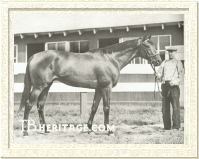
Stagehand |
|
Sickle's best racing son, STAGEHAND (b.c. 1935 out of Stagecraft by Fair Play), was bred by Joseph E. Widener, who sold him at two to Maxwell Howard. Widener also bred and raced the older brother SCENESHIFTER, who ran second in the Belmont Stakes and placed in several other good races. Like Sceneshifter, Stagehand came into hand late, being a non-winner at two, but bloomed over the winter as a three-year-old. He broke his maiden, and scored in two more races prepping for the Santa Anita Derby, which he also won, beating Dauber and Sun Egret. Against older horses In the Santa Anita Handicap, Stagehand, carrying only 100 pounds, closed strongly to beat the older Seabiscuit (with 130) by a nose. Third in the Derby Trial (to The Chief and Lawrin). |
| Stagehand ran second to The Chief in the Dwyer, and second to the same horse in the Brooklyn Handicap, but returned victorious in the Empire City Handicap in terrific style, beating Fighting Fox and Galapas while carrying 124 pounds and setting a track record. Falling off his form again, running out of the money in two races, Stagehand was third in the James C. Thornton Memorial, then won the rich Narragansett Special with Bull Lea second and Cravat third. He followed up with victory in the Governor's Handicap, carrying 124 pounds to another new track record over Two Bob and Thanksgiving. He was voted the Champion of his age group. At four, Stagehand returned to good form over the winter in Florida, winning the McLennan Memorial Handicap, setting another track record at Hialeah over Bull Lea, but was beaten by that horse and Sir Damion in the Widener Handicap. Injury forced his retirement with a record of 9 wins in 25 starts and $200,110. Retired to stud in Kentucky, Stagehand was not very successful, with just three stakes winners from 160 foals, led by the good miler Prop ($93,440).
|
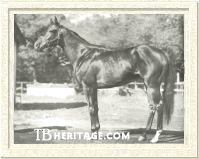
Star Pilot |
|
Sickle's other champion son, STAR PILOT (br.c. 1943 out of Floradora by Bull Dog), was bred by Coldstream Stud, and sold as a yearling for $26,000. He was the favorite of 19 two-year-olds purchased by Mrs. Elizabeth N. Graham early in 1945. Considered inferior to his stablemate, the filly Beaugay, who was voted both champion two-year-old filly and champion two-year-old, Star Pilot was the leading male in his age group with six wins in a dozen starts. Victory in the Futurity Stakes came at the expense of Beaugay, who was undefeated up to this point, but with a questionable ankle, led until deep stretch when she broke down and crashed through the inside rail. Star Pilot inherited the win when he otherwise would have run second. |
He also won the rich Pimlico Futurity, Hopeful Stakes, and Ardsley Handicap, although second in the Champagne Stakes and Grand Union Hotel Stakes. He was not considered a dominant champion however, and was rated two pounds below another stablemate in Lord Boswell, who topped the Experimental Free Handicap at 128. He was probably also not as good as the brilliant colt Spy Song, who was ranked equal with Star Pilot, but who was knocked out by injury after only four starts.
At three, Star Pilot was beaten by stablemate Knockdown in his season debut, and breezed out nine furlongs after the finish under abusive urging from his jockey as a prep for the Santa Anita Derby. In that race, Mrs. Graham took the whip from his rider in the paddock, then indicated her desire to win with Star Pilot to the jockey of stablemate Knockdown. In the stretch run, however, Knockdown held off Star Pilot, who could not close the distance under a whipless hand ride, and won by two lengths. Star Pilot did not make it back to the races that season, or again at four. At five, he ran three times unsuccessfully then was retired with a record of 17 starts, and six wins, with $187,885. Star Pilot had a disappointing and brief career at stud for Graham's Maine Chance Farm, with just 72 foals, and one stakes winner, the good two-year-old filly Star-Enfin (1949).
GOSSIP II (b.f. 1935 out of Tatoule by Alcantara II) was a younger half-sister to the good French colt Fastnet (by Pharos). Her dam was sent from France to Kentucky for the specific purpose of being bred to Sickle, and returned to France with this filly inutero. Gossip II was the champion filly of her crop at two in France. At three, she was third in the French Oaks-Prix De Diane. She did little as a broodmare in a transAtlantic career that took her from Germany to France and back to the U.S.
|
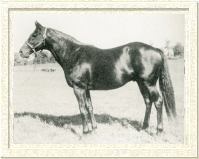
Reaping Reward |
|
Sickle's good son REAPING REWARD (br.c. 1934 out of Dustwhirl by Sweep) was bred by Arthur Hancock of Claiborne Farm after Hancock purchased the mare (in foal to Sickle) from Joseph Widener. Hancock later sold Dustwhirl to Calumet Farm, which bred Triple Crown winner Whirlaway (1938) from her four years later. Reaping Reward was sold as a yearling to Ethel V. Mars' Milky Way Stables, and both he and stablemate Case Ace were among the top flight of their crop as juveniles, behind division leader Pompoon. |
At two, Reaping Reward didn't come into his best form until late summer, winning the United States Hotel Stakes at Saratoga. He beat Pompoon in the rich New England Futurity, and ended the season with a win in the Kentucky Jockey Club Stakes.
The next year, Reaping Reward maintained his good form, but was no match for Triple Crown winner War Admiral, undefeated that season, or his rival Pompoon. Reaping Reward ran third in the Admiral's Kentucky Derby, and won the Latonia Derby, but broke down in that race while beating Eagle Pass by a half length. He retired with seven wins in 19 starts and $73,665. Reaping Reward was a good stallion, with 18 stakes winners including American Derby winner Eternal Reward, the good handicappers Star Reward, May Reward, and Quick Reward, the swift sprinter Sheilas Reward, and Nonnie Jo, all earners of over $100,000.
Reaping Reward's sons did little at stud, although Eternal Reward sired Kentucky Oaks winner Lori-El. He had several good producing daughters in Dentifrice (dam of four stakes winners including sire Ambehaving) and her full sister Sicily (dam of Flying Fury, Suspicious and Cee Zee, the latter dam of Summer Guest), plus Gray Auntie (dam of Frosty Mr.), Tuonine, and Ethel Terry.
|
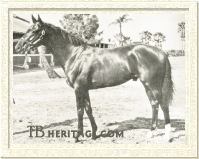
Brevity |
|
BREVITY (b.c. 1933 out of Ormonda by Superman) was bred by Joseph Widener, and an older "uncle" to Reaping Reward, being out of Dustwhirl's dam Ormonda. At two, Brevity beat Snark in the Champagne Stakes, a performance that put him not so far behind champion Tintagel in the rankings. He returned at the top of his class, briefly, at three. He won the Florida Derby by five legnths over Dneiper, setting a new world record for the nine furlongs in 1:48 1/5. Going off as favorite for the Kentucky Derby, he ran into a determined Bold Venture, who led from start to finish, hanging on by a head at the wire. |
Brevity skipped the Preakness (won by Bold Venture) and was beaten by White Cockade in the Withers, then was unplaced in the Belmont Stakes and taken out of training.
Brevity was not a very successful stallion getting only four stakes winners from 203 foals, led by Lou-Bre ($105,850) and the good Canadian gelding Be Brief.
Of all these good colts, the only one of Sickle's sons to leave a lasting influence in America was UNBREAKABLE (bl. or br.c. 1935 out of Blue Glass by Prince Palatine). Bred by Joseph Widener, his dam was a French-bred mare acquired from the August Belmont/Nursery Stud dispersal who had previously produced stakes winners Blind Play, Broadside, and Belmont Stakes winner Hurryoff. An extremely handsome colt, Unbreakable was sent to England, to be trained by Capt. Cecil Boyd-Rochfort at Freemason Lodge.
Like Sickle and many of his best sons, he proved one of the better juveniles in his crop. Unbreakable debuted in the Zetland Plate (York) in which he ran second, three lengths behind Hoity Toity. In the Windsor Castle Stakes (Royal Ascot), he was third behind Scotia's Glen, winner by a head over Far West, a neck ahead of Unbreakable. The Sickle colt won his third outing, the Exeter Stakes (6f. Newmarket) by two lengths over Saintly, and returned to win the Soltykoff Stakes (5f. 140yds. Newmarket) later that month over Golden Sovereign by three lengths, carrying top weight and giving the second place horse 11 pounds. Moving up in form and class, Unbreakable won the Richmond Stakes (6f.) at Goodwood by three lengths beating Pactolus to whom he conceded 14 pounds as topweight. In the Middle Park Stakes (Newmarket), he was third behind the classy colts Scottish Union (winner of the St. Leger the next season) and Mirza II. His season ended with three wins in six starts, and he earned a sixth-place ranking among his age group, five pounds below the leader Portmarnock, a Freemason Lodge stablemate.
Unbreakable won once in six starts at three. He botched his season debut when unplaced behind Pasch in the Coventry Stakes (8f. Kempton). He was fifth in the 2,000 Guineas, won by Pasch (beating Scottish Union and Mirza II), but had not disgraced himself, finishing strongly and only four and a half lengths off the winner. Unplaced in Bois Roussel's Derby Stakes, Unbreakable was dropped in class for the Waterford Stakes (8f. Ascot), in which he managed to regain his winning form and beat Bittern by two lengths. In the Knowsley Dinner Stakes (10f. Liverpool), he was second to Hesperian by head, giving that colt 10 pounds. In the Sussex Stakes (8f. Goodwood), he was second behind Faroe by a length. At four, Unbreakable made just two starts, unplaced behind Bistolfi in the City and Suburban Handicap (10f. Epsom), but winner of the Victoria Cup (7f.) by two lengths over Pegasus. Like his sire, Unbreakable was not up to middle distances, and seemed best suited to something short of a mile. He retired with five wins in 14 starts and £7,092 in earnings.
|
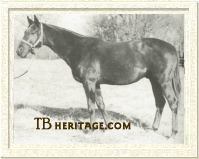
Unbreakable |
|
Widener returned Unbreakable to Elmendorf to stand alongside his sire in 1940. Built even more for speed than Sickle, with a long body, low withers, and powerful hindquarters, he had slightly sickle hocks and was somewhat back at the knee as well. Unbreakable wasn't a patch on his sire as a stallion, getting 216 foals but only 13 stakes winners. The best of these was Preakness winner and champion sprinter Polynesian (later sire of Native Dancer, Barbizon, Alanesian, etc.), but he also got the useful California runner Sturdy One ($202,970), the handicapping gelding Kaster ($186,635), and Manyunk ($165,225). Unbreakable's daughter Pandora became a useful broodmare. |
Unbreakable died in 1952 from colic at the age of 17. By unusual coincidence, Unbreakable's son, Polynesian, and grandson Native Dancer, also died from fatal attacks of colic, both at the age of 17.
Sickle's well bred son SILVER SPEAR (b.c. 1935 out of Stephanie by Stefan the Great) was also bred by Widener, and was a half-brother to stakes winner Crout Au Pot, and the mares Quickly (dam of Triple Crown winner Count Fleet) and Stepwisely (dam of Bolero and Watch Your Step). From the same crop as Unbreakable, and sent to train with him in England at Boyd-Rochfort's Freemason Lodge, Silver Spear started ten times in England, winning twice, in the Clearwell Stakes and Union Jack Stakes. He also ran second in the Lavant Stakes, and Hopeful Stakes, and was third in the Coventry Stakes and Craven Stakes. Sold to continue racing in South Africa, Silver Spear won four more races including the Durban July Handicap (11f.) at the age of four before retiring to a modest stud career in that country.
Bred by C.V. Whitney, Sickle's good son CRAVAT (1935 c. out of Frilette by Man O' War) was bred on a similar cross as Stagehand (from the same 1935 foal crop), whose dam was by Man O' War's sire Fair Play. Cravat, a younger brother to Jabot (see next) and older half-brother to the winner Equestrian (sire of Stymie), was a stakes winner at two, three, and four. At two, he won the Maplewood Stakes and was sold in the Whitney dispersal of racing stock that same year to Townsend B. Martin. At three, he won the Yankee Handicap and Jerome Handicap (over Can't Wait), and placed second in the Preakness (to former Whitney stablemate Dauber), third in the Belmont Stakes (won by Pasteruzied), the Classic (won by Nedayr), and Narragansett Special (won by Stagehand). At four, Cravat was one of the best handicappers and stayers in the country, overshadowed only by Kayak II. His wins included the San Juan Capistrano, Brooklyn, and Suburban Handicaps, and the Jockey Club Gold Cup. He was also second in the Hollywood Gold Cup, Saratoga Cup, Manhattan Handicap, and third in the Aloha Handicap and Pimlico Special. He did little at stud.
|
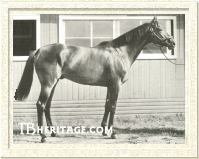
Cravat |
|
Cravat's older sister JABOT (ch.f. 1931 out of Frilette by Man O' War) was bred and raced by C.V. Whitney. At two, she was one of the best fillies of her age. She won the Selima Stakes, Juvenile Handicap, and Kentucky Claiming Stakes, and was third in the Matron Stakes. At three, she won the Speed Handicap, and returned at four to win the San Carlos Handicap and run second in the San Felipe Handicap. Retired to the broodmare ranks, she produced Whitney's 1951 Horse of the Year Counterpoint (by Count Fleet), champion of his division at three and winner of the Belmont Stakes, Jockey Club Gold Cup, Empire City Gold Cup, and Lawrence Realization. |
| BROWNIAN (dk.b.f. 1944 out of Brown Biscuit by Sir Andrew) was bred by Dr. Eslie Asbury at his Forest Retreat Farm in Kentucky. She was the best of four stakes winners produced by her dam, a half-sister to Seabiscuit. Brownian proved more of a durable racemare than a classy one, but still earned $101,725 over four years of racing with 62 starts and nine wins, mostly in the Midwest. At three, she was third in the Misty Isle Stakes, Princess Doreen Stakes and third in the Artful Handicap. At four, she was second in the prestigious Arlington Matron Handicap, and third in the Miss America Handicap. Brownian bloomed at five, winning the Tulip Handicap, Governor's Lady Handicap, Falls City Handicap. As a broodmare, she was a disappointment, producing stakes-placed I'lltakem (by Eight Thirty), although her daughter Rullian (by Nasrullah) became the ancestress of several good stakes winners.
|
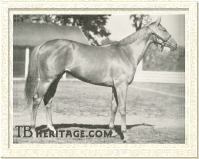
Misty Isle |
|
Beautiful and feminine MISTY ISLE (ch.f. 1938 out of Seven Pines by Haste) was the best daughter of Sickle bred by Joseph E. Widener, out of a homebred mare by his homebred Haste. Although never a champion, she may have been the best filly of her crop. She was extremely sound and started 28 times in the two years she raced, winning eleven, second nine times, and third four times, earning $50,770. At two, Misty Isle was ranked behind champion Level Best and earnings leader Valdina Myth, but still managed to win or place in 10 stakes. Her victories included the important Matron Stakes, Hyde Park Stakes, and Lafayette Stakes. |
At three, Misty Isle was ranked behind champion Painted Veil, but had a tremendous season as Queen of the Midwest. She beat good older males in the Sheridan Handicap and set a track record in the process, and beat older fillies and mares in the Princess Pat Stakes, then trounced her rivals, including Blue Delight, by five lengths in the Falls City Handicap. As a broodmare, Misty Isle produced the excellent filly Cosmic Missile (1944 by Roman), winner of the Gazelle, Ashland, and Jasmine Stakes at three.
Other good racing daughters of Sickle included FARMERETTE (1940 out of Cottage Cheese by Milkman), winner of the Correction and Colonial Handicaps at three; and FAIR WEATHER (1940 out of Fairday by Fair Play), a good two-year-old when she won the Dover Stakes, Polly Drummond Stakes, and Keeneland Special Event Stakes. Fair Weather produced stakes winner American Glory (by Roman), stakes-placed Shy Katie, Cat Key (dam of Puss N Boots), and the sire Fair Ruler.
Besides Reaping Reward, Unbreakable, and Brevity, a few other sons of Sickle became useful sires, including the stakes-placed AGRARIAN (1931 out of Mary Jane by Pennant), and stakes winner BLESS ME (1939 out of Buginarug by Blue Larkspur).
On the other hand, Sickle's daughters left a much more important legacy. Jabot has already been noted as the dam of champion Counterpoint. His other top producers included THE SQUAW II (dam of C.C.A. Oaks winners How and Cherokee Rose, and stakes winner Sequoia), BE LIKE MOM (a daughter of champion Black Helen, and dam herself of champions But Why Not and Oedipus), VIXENETTE (dam of Dan Cupid, Relyonme), BLADE OF TIME (dam of Bymeabond, Guillotine, Ruddy, Blue Border, and Kerala, the latter the dam of champion Damascus), Pansy (dam of Social Outcast), TAJ BIBI (dam of Papa Rdebird), SICKLEFEATHER (dam of Anthemion, Softie), CREESE (dam of Pretty Does, Edgey), and MISS BRIEF (dam of Cable, Ocean Brief, Mr. Brief, and Holdall).
In all, Sickle left a legacy that suited American racing well at the time. He was a source of precocious ability and great speed up to about a mile. A few of his best sons like Stagehand, and to a lesser degree, Reaping Reward and Brevity, showed good form past a mile, but his primary influence was in the sprinting speed passed on by Unbreakable to his son Polynesian, to Polynesian's great champion son Native Dancer. It's worth noting that one of Native Dancer's best sons, the French-raced colt Dan Cupid, was out of the mare Vixenette by Sickle and thus inbred 4x2 to Sickle. Dan Cupid sired the great French racing star, Sea-Bird.
--Anne Peters
|
|
|
|

